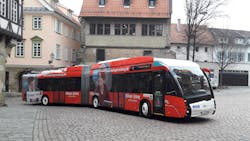Esslingen’s Battery Trolleybuses with IMC from Vossloh Kiepe Introduced to Wide Trade Audience
At a specialist event, Esslingen Municipal Transportation Authority (SVE) presented its new battery trolleybuses with In-Motion-Charging (IMC) from Vossloh Kiepe to an international trade audience and representatives of the media. The four electric hybrid buses ordered by SVE from consortium partners Vossloh Kiepe and Solaris Bus & Coach S.A. have been on regular line service since late 2016.
A combination of expert presentations and a test ride left visitors to the event with a comprehensive impression of Esslingen’s electric buses. The IMC articulated buses are equipped with lithium titanate (LTO) traction batteries which, with 37 kWh of usable energy and an output of 240 kW, enable normal operation on sections of the route with no overhead contact lines.
Even in unfavorable conditions, the buses have an operating range of ten kilometers in battery mode. This was one of the main reasons why Esslingen opted for this technology: “On our 113 route the electric hybrid buses cover two-thirds of the distance on battery power. This enabled us to bring the Berkheim district into our zero-emission mass transit network with no additional infrastructure costs. Ever since they entered service these vehicles have been as reliable as diesel-engined buses,” said a delighted Harald Boog, head of operations at SVE. “As the main challenges in IMC buses are not so much mechanical as in the electrics, electrical system specialist Vossloh Kiepe lead managed the consortium,” he added.
Visitors showed strong interest in the vehicles’ performance data. The battery trolleybuses have a top speed of 65 km/h in both operating modes. With their dual axle drive with 160 kW available at each powered axle, the buses offer outstanding performance even on gradients and in difficult weather conditions, and recuperate energy efficiently.
“The key to our success was the development of a new, powerful battery charging concept. This cleared the way to topping up the battery fast on the short stretches with overhead lines,” explained Vossloh Kiepe project manager Joachim Berndt. If necessary the buses can draw on up to 600 kW while hooked up to the overhead lines. “The IMC concept means that it takes only short sections with overhead lines to reliably eliminate the risk of a recharging bottleneck,” said Erik Lenz, head of sales, buses and electric mobility.
When the presentations were over, the trade visitors were able to gain a first-hand impression of the vehicle’s performance during a test run on regular routes in Esslingen. The bus’s powerful acceleration in battery mode was demonstrated on an uphill stretch. The slight difference between battery power and the stretches under the overhead lines was generally not noticeable.
Against the backdrop of current demands for public transportation operators to make a substantial contribution to protecting the environment, with the IMC concept the electrical systems specialists at Vossloh Kiepe offer a practical and sustainable approach.
IMC permits fleet operators to run any number of electric buses reliably, leading to measurable improvements in air quality in urban environments around the world. In this reference project in Esslingen, an uncomplicated electric bus system has been implemented that enables the buses to be operated round the clock without a break, presenting a future-oriented approach that many public transportation authorities could adopt in many different places.
